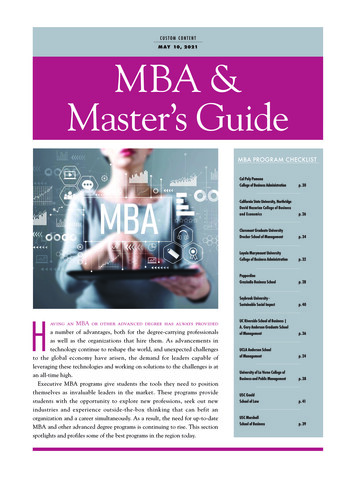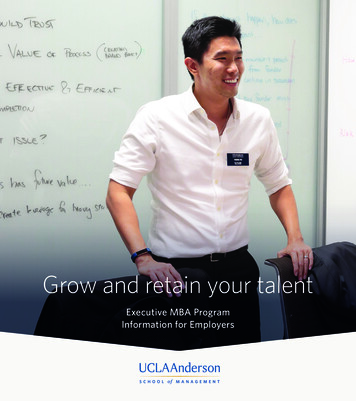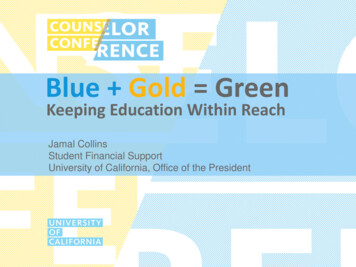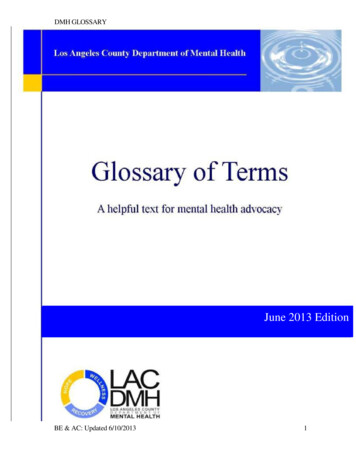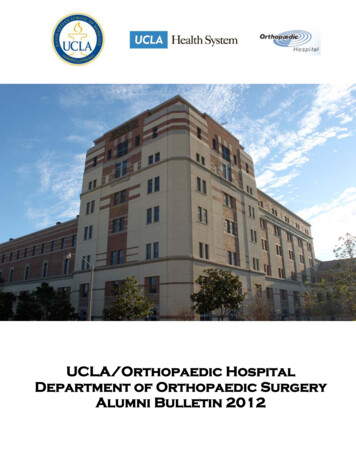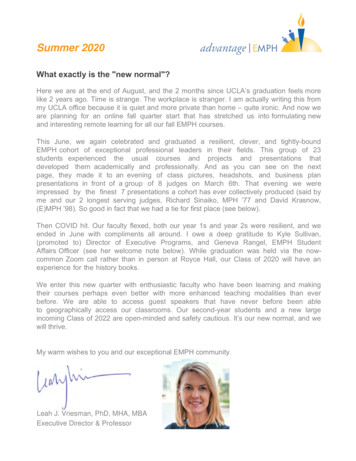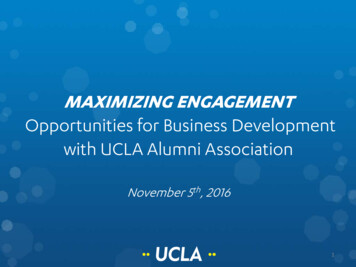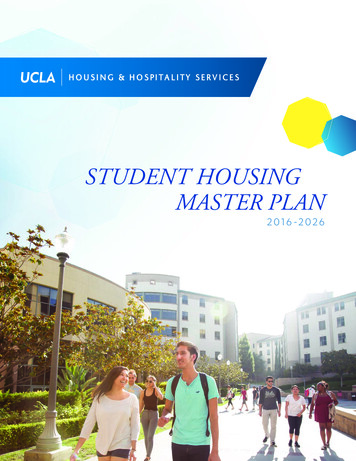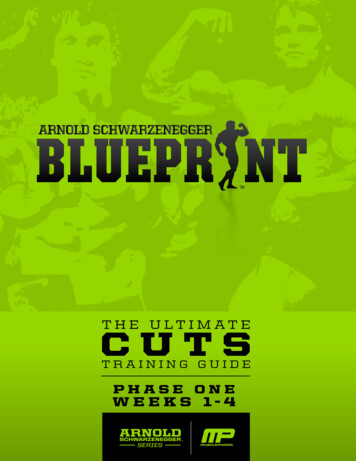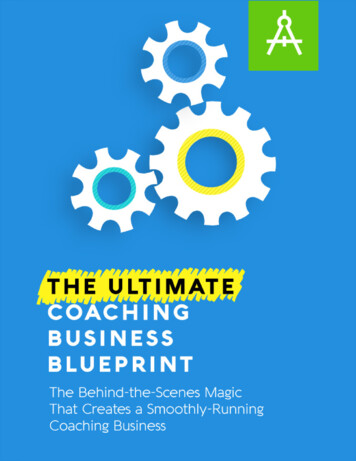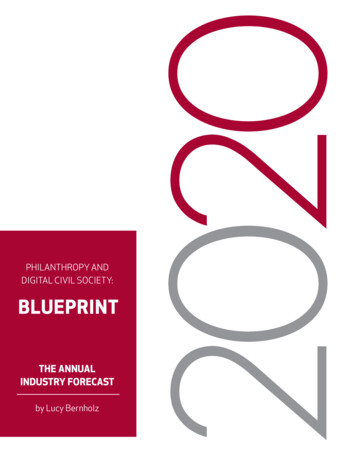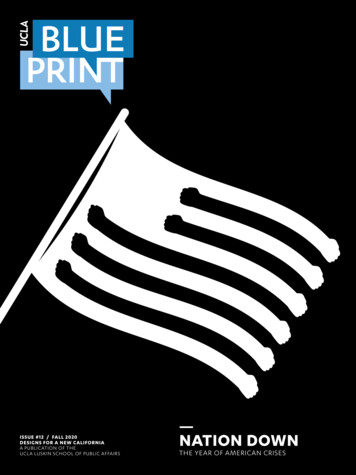
Transcription
ISSUE #12 / FALL 2020DESIGNS FOR A NEW CALIFORNIAA PUBLICATION OF THEUCLA LUSKIN SCHOOL OF PUBLIC AFFAIRSNATION DOWNTHE YEAR OF AMERICAN CRISES
EDITOR’SOTEINSIDEBLUEPRINTISSUE #12 / FALL 2020BLUEPRINTA magazine of research, policy, Los Angeles and CaliforniaAMERICA HAS CHANGED, three times over, since the beginning of 2020.When the coronavirus swept across the world at the beginning of the year,it spared no place; it did not observe travel bans or national boundaries.Only hygiene and distancing slowed its destructive swath, and the UnitedStates haltingly and unevenly accepted those realities. By fall, this nationwas suffering from COVID-19 more acutely than any other developedcountry, and the death toll pushed past 200,000, nearly four times as manyAmericans as died in Vietnam.That calamity gave rise to a second: the collapse of the American economy.Gross domestic product plummeted by more than 30% in the second quarter.Millions of jobs were lost; countless businesses shuttered, many forever.And then, amid fear of disease and the realities of unemployment andstress, the nation revisited its most difficult and unfinished debate: racerelations. Spurred by the killing of George Floyd at the hands of Minneapolispolice on May 25, Americans yet again gazed in fury at one more video ofofficers pressing their force against a Black man, in this case pinning his neckto the pavement with a knee as he pleaded for help. “I can’t breathe!” becamethe cry of a renewed call for racial justice; and protests, overwhelminglypeaceful though occasionally violent, erupted across the country.America has weathered many crises. It has fought wars, including a CivilWar, and faced ravaging epidemics and economic disruptions. It is not truethat the country has never been more divided, or that these challenges areunprecedented. But they are intensely demanding, nonetheless. Rarely, ifever, have three such urgent traumas arrived together — and in an electionyear, no less.This issue of Blueprint examines how these events are affecting Americans and values they consider very important — their families, communi-ties, shelter, safety and politics. How do we help one another in a time ofdivision and uncertainty? How do we safeguard children who are at risk,unable to protect themselves, sometimes from their own parents, whennormal access to help is shut down? How do we select leaders when humaninteraction in politics is limited, beginning to end: from rallies to the polls?And how do we fend off danger when those charged with securing our safety— the police — are no longer trusted by many whose lives they are responsible for defending?These are fraught times, days when the pillars of society seem unableto support much of what it means to be an American. As the Democraticand Republican national conventions played out this summer, it was difficult to believe that both were addressed to the same America, so divergent were their views of our country.Yet the fundamentals — family and community, a place to live and a jobto do — transcend party and ideology. They give meaning not just toAmerica but to life itself. Such values must survive, no matter the conditionof the Republic or who leads it. Managing our crises, explored in this issueof Blueprint — our 12th and biggest ever — is centered around the exploration and preservation of our values, both at UCLA and beyond. That isnoble work, and badly needed.INFOGRAPHICSSPECIAL REPORT –A CLOSER LOOK12 VIRUS, ECONOMY, RACEThe three-act crisis that has gripped Americain 202034 THE STATE OF THE LEAGUEThe League of Women Voters confronts theworld of divisionFEATURED RESEARCH14 CHILDREN AT RISKReports of child abuse declined with COVID-19.Why?18 UCLA ON LAPDNew evaluation offers fresh thinking aboutpolicing L.A.LANDSCAPE22 ACTIVIST ACADEMICAnanya Roy and the role of the university insecuring justice02 PERFORMING ARTSAn artist in shelterTABLE TALK03 GOVERNINGCouncil leader seeks to help38 CONGRESSMAN ADAM SCHIFFSchiff discusses Donald Trump, the 2020election and the shaky state of American values04 OPTIMISMIt’s hard to be positive04 ACADEMIAA student adjusts05 FAMILYMixed-race family confronts first the virus, thenracial reckoning06 “LIGHTER LOOK”Rick Meyer on isolationJIM NEWTONEditor-in-chiefCLOSING NOTE42 LIFE AFTER CRISESPROFILE08 BERNARD PARKSLAPD Chief and Councilmember on race andpolicing26 PANDEMIC POLITICSHow to campaign, count votes and chooseleaders at a moment of crisis30 RETHINKING POLICECan policing ever protect and serve?TO READ PAST ISSUESOR SUBSCRIBE TOBLUEPRINT GO TOBLUEPRINT.UCLA.EDU
2 LANDSCAPE BLUEPRINT / FALL 20BLUEPRINT / FALL 20 LANDSCAPE 3FIRST PERSON:line (and the title of my EP, for that matter) mockedme. There are so few certainties in a music career,but touring is one of the few paychecks you cancount on. There is no ladder, no neatly forged path.Your product is, after all, the poems you pull outof your head, and your relevance is subject to thewhims of public opinion. To stay sane, I tend tofocus on the “doing.”Quarantine slowed and narrowed life and riledup my insecurity as a songwriter and performer:Does my contribution matter? When I’m on theroad or playing shows, the process itself — theactivity — is a distraction from this question. Butthe stillness of quarantine is quite different from thesolitude of riding the train to a new city or sittingalone in a hotel room after a show. My ears don’thum from the PA system; I’m not nervous abouttomorrow’s performance. There is no routine tofocus my attention or to distract from it.That’s not to say this time has been empty. Tothe contrary, it’s been an opportunity to considerwhat matters and how best to contribute. Eachweek of isolation brings new public awareness forimportant causes. At a moment when we must beacutely aware of the “essential” and at a time whenlives and livelihoods are being lost and examined,I can’t help but wonder whether music matters.Moreover, as a cis-White woman who writes abouther own experiences, do my experiences matterright now? If focusing on the “doing” is what helpsme create, is now an appropriate time to be sonarrowly focused on my own story?Today, I watch as the year I welcomed with asong about goodbyes spins by out my window. Idesperately want to get back to the doing — butperhaps sitting with the questions is exactly whereI should be. There will be songs and shows again —they’re inevitable, at least for me, because makingmusic hasn’t ever been a choice. I’m becomingincreasingly grateful for the stillness.LIVINGTHROUGHCRISESTHE PERFORMINGARTSby Eva B. RossON JAN. 1, 2020, I WAS IN CHICAGO. It was themorning after closing night of a New Year’s holidayrevue I had been performing in at the Studio 5 Performing Arts Center. The cast and crew gatheredearly for a wrap party. The Rose Bowl Parade buzzedin the background. In the midst of it all, I had an ideafor a song, so I slipped away from the party, went tothe basement and jotted it down. I called it “HappyNew Year.” The first line went,Adding up the coming months,it’s looking like I’ll see you whenI see youIf I learned anything from last year,it’s that I can’t count on anything —so I’m trying not to count on thisWhen I wrote it in January, I was writing about hesitancy toward love after heartbreak. By March, thisQUARANTINE SLOWEDAND NARROWED LIFE ANDRILED UP MY INSECURITYAS A SONGWRITER ANDPERFORMER: DOES MYCONTRIBUTION MATTER?ILLUSTRATION BY NOMA BARFor this special editionof Blueprint’s Landscapesection, we asked writersto consider the ways theirlives have been changedby this year’s crises.Contributors include arecent UCLA graduate,a performing artist andthe President of the LosAngeles City Council,among others. Here aretheir thoughts.At the time, I was gearing up for a year mostly onthe road. I’d just released my first EP, “Playlist for theApocalypse,” in October; most of January wouldbe spent doing an East Coast run; a few L.A. showsin February; and in March I'd be playing gigs in theU.K. and Ireland. I was craving the solitude thatcomes with being on the road — surrounded bynew people, yet swept along in motion.March changed all that. Shows everywherewere canceled; venues shut down indefinitely,some perhaps forever. Instead of touring, I wasrecording “Happy New Year” via Zoom sessionfrom my home in L.A. Strangely, the song was stilltrue, but its meaning had changed. It was, indeed,a new year — but almost as if the universe had beenlistening a bit too intently to my inner yearning forsolitude, loneliness was now government-mandated, and the unknown of the road had been replacedby an enveloping uncertainty.The chorus of “Happy New Year” goes:And on days where my head is heavy, I go fora walk. I listen to music. A few songs in and thenthat one comes on, the one with the warm chordsand the chorus that makes each step feel lighterthan the last. The sidewalk is a church pew, andunder my mask, I’m mouthing along with an entirecongregation. The music is . essential.For now, I am listening, I am inspired, and I amcoming to understand the purpose of my work. Asfor the shows? I’ll see them when I see them.GOVERNINGLOS ANGELESby Nury MartinezI DON’T SLEEP MUCH. I stay up late, reviewingreports and briefs my staff sends me, watchingthe news and scanning my phone for storiesthat might impact my constituents here in thenortheast San Fernando Valley and across the city.In these dark days of COVID-19, where Latinosand Blacks are the No. 1 victims of the health andeconomic effects of this deadly virus, relevantstories aren’t hard to find.Mornings start early in our home in working-class Sun Valley, which I share with my husband and 11-year-old daughter. She’s brilliant,thoughtful, caring — and stubborn (like hermom). I overheard her talking to a friend recentlywho was concerned her family was going to losetheir housing. It was similar to a story she toldme back in January before I became City Councilpresident — when another friend’s father brokehis arm and could not work. She asked me then asshe did now: “What is going to happen to them?”As a Latina who grew up the child of working-poor immigrants, my answer has been a FamiliesFirst Agenda that I launched when I became councilpresident. It prioritizes the working poor — peoplewho do everything right and still struggle.Unfortunately, COVID-19 also prioritizes theworking poor.Even when I’m exhausted after a full day andnight of work, as well as mom, wife and daughterresponsibilities to assist my 81-year-old mother,that reality keeps me up.As a child, I would sit at the feet of my latefather, a Mexican immigrant who took the bus sixdays a week for 30 years to work as a dishwasher tosupport our family. We would watch Spanish-language news together and talk about politics andthe world around us.“Necesitas saber lo que está pasando, hija.”You need to know what’s going on, he would say.My father was empowering me. He was thefirst male feminist I ever knew. He taught me compassion and to consider all people’s perspectives.I miss him every single day.My mom worked as a seamstress and a factoryworker. She is a strong woman whose rules werethe law in our house. She taught my sister andme to be bold, assertive and fearless as women.Our parents also instilled in us a strong workethic.During the pandemic, while other governmental bodies delayed meetings for long periodsof time, our City Council continued to meet virtually, and still does.Since my staff and I and others have to physically be in council chambers for those meetings,it is not without risk.Since March, we’ve had several City Hall staffand family members test positive for COVID-19.I’ve been tested twice for possible exposure tothe virus. Unlike more than 230,000 Angelenos,I tested negative, and thank God all who testedpositive have recovered.COVID-19 is pushing our working-poor families, and others, to the breaking point. And it’spushing children to have unnatural conversationsabout rent, bills and money.I’ve worked with my colleagues on the CityCouncil to protect them by enacting a strongeviction moratorium, and directing hundreds ofmillions of dollars to provide renters relief, childcare, eviction defense, free grants for small businesses, including street vendors, and a programthat will pay low-income workers who test positivefor the virus to stay home and recover. We’ve alsoenacted worker retention laws and paid familyleave during COVID, as well as hosted communityfood and diaper giveaways, free laundry serviceUNFORTUNATELY, COVID-19ALSO PRIORITIZES THEWORKING POOR.and countless other assistance events throughoutthe city, but my overriding fear is it will not beenough. We need more state and federal assistance to keep people in their homes — especiallywhere we lack funding or legal jurisdiction to act.On a separate track, the murder of GeorgeFloyd and other Black Americans by law enforcement has rightly led to a reckoning on racism thathas been due in this country for hundreds of years.It is my hope and goal, as the City of Los Angelesreimagines public safety, that those Black andBrown communities who are directly impactedand will be affected by any outcomes are the oneswho lead the discussion on solutions.I grew up in Pacoima and worked as a socialand environmental activist. When I became thefirst Latina City Council president in 170 years,I said, “Little girls who looked and sounded likeme didn’t ever think they could one day hold suchpositions of power.”There are some who wish it weren’t so. Ascouncil president, I routinely experience racist,sexist and sexually abusive attacks from protestersoutside my home, in City Council meetings andon social media. None of that will keep me fromdoing this job that I love. I am a strong Latina, andjust like the people I represent, I don’t quit.Martinez in the president of the Los AngelesCity Council.
4 LANDSCAPE BLUEPRINT / FALL 20I ALWAYS HAVE BEEN AN OPTIMIST.With encouraging friends and a caring family,I have never felt the impulse to think that I couldnot overcome an obstacle and had to accept defeat. This was perhaps never truer than in seventhgrade at Holy Angels grammar school, when ourhomeroom teacher began a weekly after-schoolprogram for students who wanted to do morewith their writing than our textbooks required.She and our parents volunteered, at no cost, torun this program. I realized then that people werenot necessarily limited by institutional constraintslike school hours, and that I could put my dreamsinto action regardless of any perceived barriers.My optimism became a habit of mind. Sometimes I have been disappointed. But more often, Ihave been right to hope. So it is that I believe now,as I always have, that people will eventually overcome their differences and fears, both large andpetty. I believe that we, meaning everyone, will atsome point endeavor to find a way toward a greatness beyond what we currently think is possible.Even so, I also believe that hope, however enduring, must be tempered by history. The 1930s,for example, were a time much like our own,tormented by economic dislocation, outburstsof prejudice and sociopolitical discord. Many inTHE UNASSAILABLE TRUTH ISTHAT UNLESS WE SAFEGUARDOUR HOPE AND NURTUREIT INTO GROWTH, THEN OURPRESENT WILL SKID INTOPERMANENT DISREPAIR.that era, including a large number of intellectuals,lost faith in democracy. They felt compelled tochoose between left-wing and right-wing authoritarianism. The future, however, belonged tothose who retained the belief that liberal, pluralistdemocracy was not simply the most decent wayforward but also the most pragmatic. Democracy,as Winston Churchill said, was the worst form ofgovernment — except for all the others.Today, many of us have fallen into believingshared a presentation on a goofy topic, replacedtraditional social gatherings. Living interestinglyisn’t easily thwarted.In late May, everything changed again, asprotests began around the country in responseCAMPUS LIFE ANDBEYONDby Audrey PrescottSOMETIMES YOU DON'T KNOW which time mightbe the last time.I was in Powell Library when I heard that remaining finals and all classes for the spring termwould be offered remotely. Because other UCcampuses had already announced similar plans,I wasn’t surprised. But I didn’t realize this wouldbe my last time in the iconic library as a UCLAstudent.At first, things were chaotic and weird. Itseemed as if no one, least of all students, reallyknew what they should be doing. Off campus,canned goods and toilet paper disappeared fromgrocery aisles as the panic and confusion set in.Many students returned to their hometowns,emptying campus and changing the compositionof Westwood. Before long, I had two new roommates, a guitar that I had bought on impulse, andfour new classes to attend through Zoom.Anonymous posts on a Facebook page called“UCLA Secrets” offered glimpses of life throughthe eyes of my peers. Some told of economic anxieties, others recounted forced returns to abusivehomes. Academic challenges vied with concernsabout public health and politics. And yet, even asso many things changed, some did not: I wokeup every day for classes, read academic articlesand procrastinated on assignments. Old habitsblended with new routines; together, they createda “new normal.”For every strange new aspect of life — constant sanitizing, avoiding other pedestrians —there were little bursts of life: laughing with myroommate as she sang “Happy Birthday” to hergrandma on a family Zoom call while I sat nextto her attending a lecture; missing the chanceto meet any of my spring quarter professors inperson but greeting a professor’s 15-year-olddaughter during an online seminar. Remotefriendship became a fact of life and reunited mewith high school friends. Zoom happy hours andcreative PowerPoint parties, where each personCHANGE BEGAN HAPPENINGON A PERSONAL ANDCOLLECTIVE LEVEL,AS MY PEERS AND ISIMULTANEOUSLY EXAMINEDOURSELVES AND THESYSTEMS WE PARTICIPATE IN.PHOTO BY EMILIANO BAR / UNSPLASHby Aidan Ruttenour historical moment requires that we choosebetween an illiberal progressivism on the left andan aspirational fascism on the right, of the sortproposed by, say, Donald Trump or Hungary’sViktor Orban. Against what many would say is allthe evidence, I reject that as a false choice.My own academic career seems to havebeen defined by decline. Dangerous regimesand a chilling rise in illiberal democracy aroundthe world have been made more alarming by anAmerican president who admires the same despots responsible for those assaults on democracy.Watching in sorrow as crisis after crisis drenches the daily news would be bad enough, if not forthe fact that we humans are largely the cause ofthese miseries. To avoid seeming pretentious, Ionce refrained from this kind of commentary, butit has become impossible to ignore the fact thatour willful collective selfishness and failures areresponsible for so many afflictions in the world.My empathy has grown a thick callus as I prioritize what to be the most upset about. Everytime I hear something outrageous about thepresident, I just nod and continue with my day.A significant number of Americans apparentlyare no longer disgusted by family separationsat the border, collusion with foreign powers,withholding military aid in exchange for politicalfavors, race baiting, pointless lies about rally size,and a lifetime of inexcusable personal behaviorthat would have barred literally anyone else fromthe Oval Office. Beyond the White House, thisadministration’s ineptitude has made other crises,like climate change, refugees, institutional racismand, of course, COVID-19, far more frightening,because people know that any response is likelyto be, perversely, the wrong response.I am saddened — and a bit battered — byeverything that is happening, but for all of its flawsand uncertainties, my generation is passionate,aware and motivated to seek social change. Whilewe may not always pursue this change in the mosteffective or efficient ways, our passion for reform,when tempered by knowledge and experience,will lead to a better future.The unassailable truth is that unless we safeguard our hope — the optimism I was fortunateto learn at home, in school and from experience— and nurture it into growth, then our presentwill skid into permanent disrepair. Our future willbe grim. In a vicious circle, our pessimism will givebirth to irrefutable reasons to abandon hope.One day, I believe, we will achieve a societythat provides equal treatment and opportunitiesto all, encourages everyone in their strengthsand helps them overcome their weaknesses. Wecan achieve greatness by caring for each other,creating new ideas, inspiring art and liberatingtechnology.We will one day cure more diseases, includingCOVID-19. We will embrace the future and exceedthe bounds of history.ILLUSTRATION BY NOMA BARA TESTOF OPTIMISMBLUEPRINT / FALL 20 LANDSCAPE 5to the murders of George Floyd, Breonna Taylor, Ahmaud Arbery, Tony McDade and so manyothers across years and generations. The senseof pent-up anger was unmistakable and powerful. The social upheaval directly responded tohundreds of years of racial violence that hadbeen normalized long before COVID-19. And itexpressed the frustrations that came with risingunemployment and lack of access to healthcareduring the pandemic.Change began happening on a personal andcollective level, as my peers and I simultaneouslyexamined ourselves and the systems we participate in. People I had known for years, but whohad never seemed politically active, floodedInstagram with tales of radical transformation.Selfies and nature photos were replaced with infographics and resources for education and action.Ideas that I was accustomed to engaging within sociology classes and Twitter circles becametopics of common conversation among friendsand family. A long-overdue social awakening iscontinuously taking place, and it’s difficult anddefeating, exciting and beautiful all at once. Thecoronavirus forced us indoors and away from oneanother. Our anger, hope and drive for changebrought us outside in protest and together again.There is an odd feeling that comes with beingin a stage of personal transition at the same timeas society. I was in a new city and a month into college when the 2016 election altered my childhoodview of politics. Now as I graduate during a pandemic and civil rights movement, my perspectivesare shifting once again. I’ve generally experiencedchange in small increments that don’t drasticallyalter my daily routine. Now I have immersed myself in change: impulsively dying my own hair inmy bathroom, interviewing for jobs over Zoom,and examining every thought and viewpoint thatpasses through my mind.Since March, I have gone from a college student eager to graduate — and patiently considermy place in the world — to a recent graduate whois ready to change it. The world is moving towardthe next new normal, and I’m determined to bepart of it.FAMILYby Zach Slobig“I GUESS YOU COULD SAY I’m playing Russianroulette.” My brother Tim was on the phone. Itwas several weeks into statewide shelter-in-placeorders back in April. “I’m really taking a risk everyday, and it feels like they’ve just sacrificed us.”He was trying on a new identity, one that hedidn’t choose for himself: “essential worker." Timis a supervisor at a busy L.A. branch of a majorhome improvement retailer, and he was gettingnervous. A coworker had tested positive for coronavirus — someone he worked closely with — andother people were starting to stay home. He wascontinuing to work, despite available sick leave. Italked to him while he stood at the door, countingcustomers and making sure they wore masks.The line snaked out into the parking lot and downthe street. “If this thing gets really bad and theyhave to shut down the store,” he wondered aloud,“where will I be then?”Tim, three years my junior, is Black. I’m White.We have an older Black brother, an older Whitebrother and a Black sister. A two-toned familyforged by adoption made for a curious sight inour working-class neighborhood in Washington,D.C., during the ‘70s and ‘80s. We five siblingshave taken divergent paths in the decades since.These days I work as the writer and editor for aSilicon Valley-based philanthropy. Tim’s past ischeckered. He spent just shy of 13 years incarcerated for bank robbery. He was shuffled amongfederal prisons in Oregon, California, Louisiana,and Virginia, with roughly a year and a half of thatin segregated housing: “solitary.”Over the course of some eight weeks, as Timand I talked on the phone regularly, we settledinto and bumped up against the unfamiliar anduncertain reality of the new pandemic-impactedworld we shared. As familiar and fatal acts of policebrutality sparked an uprising for racial justice thatswept the nation, I was reminded of the worldswe’ll never really share.“I feel like I’m in prison!” During shelter-inplace, while I scrolled through social media, Ihad been reading comments like that from folksgetting antsy with self-isolation and social distancing. As the weeks wore on, my daughter’sSan Francisco public school closed its doors, andthe streets emptied around me. I wondered howthis moment looked through the eyes of someonewho had truly known confinement.Self-quarantine and “solitary” have very littlein common. “I never told you the story of my firsttime in there, but I lost my mind,” Tim told me.He had been in solitary for months and beganhearing voices within weeks. Convinced that eyeswere watching him at all hours from the other sideof his mirror, he covered it with toilet paper andplugged the vent. He would wake up gasping forbreath. He watched the walls close in around him.“I’d smash my face up against that little window inthe door so there was no way I could see the cell,so I wouldn’t feel like I was in that box,” he said.“You never recover from that.”This was in the federal prison at Lompoc — thesame place he met my daughter for the first time.Nami, not yet a year old, sat there on his kneesmiling up at her uncle, his scarred and tattooedhands cradling her gently. “It felt like I was holdinga little baby doll,” he remembered.As our phone calls continued, Tim shared asense of regret for squandered time. He wondered aloud: If he had worked harder and hadnot been a knucklehead, would he be livingcheck-to-check now, putting his health on the lineevery time he punched a clock? Meanwhile, mywork life had shifted entirely to Zoom calls, andI barely left the house. He and I were navigatingthe worsening pandemic in very different boats,and the layers of privilege separating me fromTim became glaring. Our family may have been aCarter-era vision of racial harmony, but it was not
6 LANDSCAPE BLUEPRINT / FALL 20read about it in the papers.” He told me of savagebeatdowns and indifferent stabbings for 50debts. “There’s gonna be full-fledged riots if thisthing gets out of control in there,” he said, foretelling the outbreaks of the virus at San Quentinand other prisons during the months ahead.By the beginning of May, the rumor mill atTim's job had kicked into high gear. At least 10 ofhis coworkers had tested positive for COVID-19.Check-cashing places near work had closeddown, and he now had to go to liquor stores toget monthly money orders for his restitution payments. “There’s no app on your phone for that,”he said, laughing. His parole officer had beenhounding him, saying he’d fallen behind. “Man,this is the best I’ve done in my whole life — thelongest time I’ve had an honest paycheck — butthey don’t let up,” he said. “Their job is to stand onyour neck and see if you can handle the pressure.”“A LIGHTERLOOK”by Rick MeyerSOME THINGS WILL HAPPENNATURALLY. YOU WILLREMEMBER FONDLY WHENMAKING EYE CONTACT WASPOSSIBLE — OR HUGGING AFRIEND, OR HIGH-FIVING ASTRANGER AT A BALLGAME.Rick Meyer’s regularly appearing column takes alighter look at politics and public affairs aroundthe world. This month: A Community of OneFOR MY BARBECUE IN THE BACK YARD, I broughtmy own food. One hot dog. One hamburger. Onedip for the chips. It was OK to double-dip. I savedthe paper plate and the plastic knife, fork andspoon. I could use them again. After I cleanedthe grill, I played solitaire.The next day, I went back to food that fit underthe door.I planned my next trip based on recommendations I found on the Internet: I’d visit Las Kitchenas, Costa del Bathrrome. St. Balonica. La Rotandade Sofa, Santa Bedroome and El Bed.Isolation — was it lonely, or was it just me?We’ve learned many things from the coronavirus pandemic. At the top of my list is how tobe by myself. I was serious about sheltering inplace, and I’ll never forget what it was like to be acommunity of one.You can make a speech to yourself. No podium, microphone or stage required. You don't haveto dress up. You don't have to dress at all.You can deliver the speech in the shower.Or you can sing in the shower. Nobody willcomplain.Indeed, you don’t even have to shower. Orshave. Or get a haircut.It’s a thrill when Amazon delivers your deodorant.You can let the dishes pile up. You can napfor as long as you like. You can refuse to makeyour bed.You don’t have to vacuum, or you can vacuumall afternoon if you're bored.You can try ambitious things that you’ve always wanted to do: Read War and Peace. Nobodywill interrupt. Or memorize Marc Antony's eulogyfor Julius Caesar. If you muff a line, who will know?You can talk to a squirrel on your front lawnand laugh at his response.You can turn off news about tweet rants; stupidity is contagious. Tweet your own lies, insultsand conspiracies. At least they’ll be intelligent.Some things will happen naturally. You willremember fondly when making eye contact waspossible — or hugging a friend, or high-fiving astranger at a ballgame.You will also think, not so fondly, of thingsthat you are glad to be missing. The New Yorkeroffers these:The Boston Symphony Orchestra Playsthe Throat Noises of Rudy Giuliani.Slide-Whistle Night at Yankee Stadiu
of Blueprint — our 12th and biggest ever — is centered around the explora - tion and preservation of our values, both at UCLA and beyond. That is noble work, and badly needed. JIM NEWTON Editor-in-chief BLUEPRINT A magazine of research, policy, Los An
